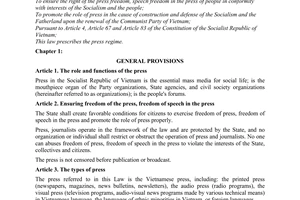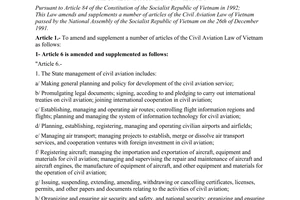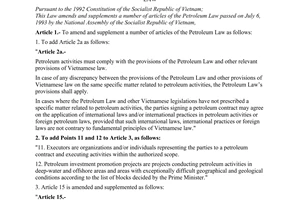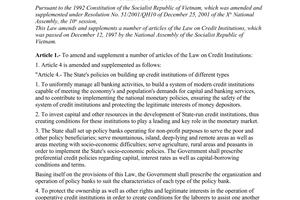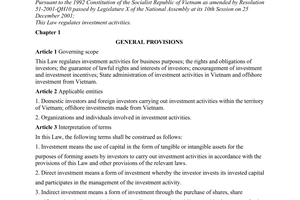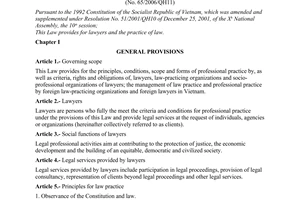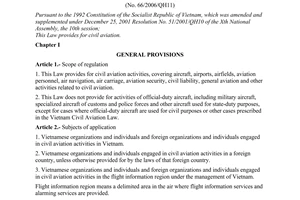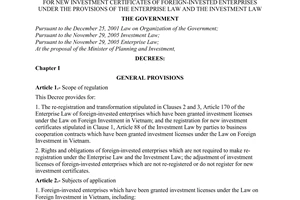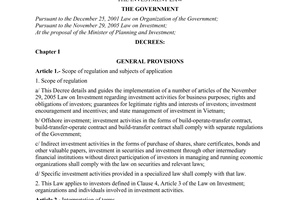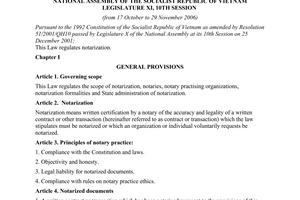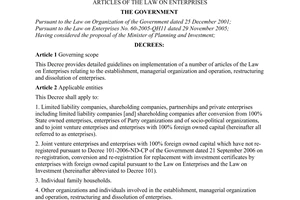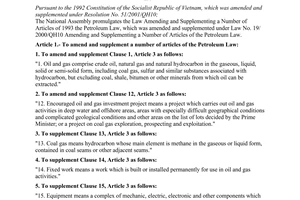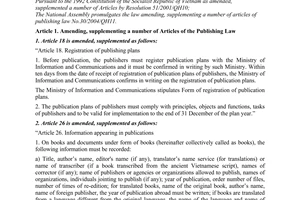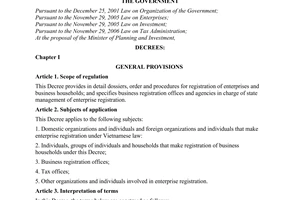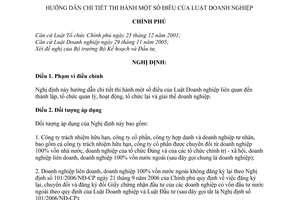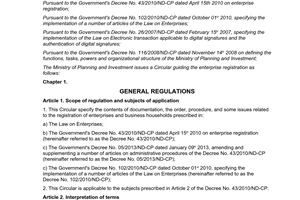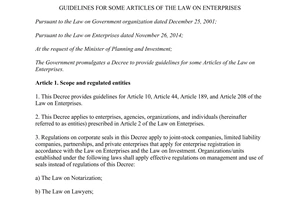Decree No. 102/2010/ND-CP detailing a number of articles of the Law on enterpris đã được thay thế bởi Decree No. 96/2015/NĐ-CP guidelines the Law on Enterprises và được áp dụng kể từ ngày 08/12/2015.
Nội dung toàn văn Decree No. 102/2010/ND-CP detailing a number of articles of the Law on enterpris
|
THE
GOVERNMENT |
SOCIALIST
REPUBLIC OF VIET NAM |
|
No. 102/2010/ND-CP |
Hanoi, October 01, 2010 |
DECREE
DETAILING A NUMBER OF ARTICLES OF THE LAW ON ENTERPRISES
THE GOVERNMENT
Pursuant to the December 25,
2001 Law on Organization of the Government;
Pursuant to the November 29, 2005 Law on Enterprises;
At the proposal of the Minister of Planning and Investment,
DECREES:
Article 1. Scope of regulation
This Decree guides in detail a number of articles of the Law on Enterprises regarding the establishment, management organization, operation, reorganization and dissolution of enterprises.
Article 2. Subjects of application This Decree applies to:
1. Limited liability companies, joint-stock companies, partnerships and private enterprises, including also limited liability companies and joint-stock companies transformed from wholly state-owned enterprises, enterprises of Party or socio-political organizations, joint-venture enterprises and wholly foreign-owned enterprises (below collectively referred to as enterprises);
2. Joint-venture enterprises and wholly foreign-owned enterprises which do not re-register under the Government's Decree No. 101/ 200n/ND-CP of September 21. 2006. on re-registration, transformation and registration for renewal of investment certificates of foreign-invested enterprises in accordance with the Law on Enterprises and the Investment Law (below referred to as Decree No. 101/2006/ND-CP);
3. Business households:
4. Other organizations and individuals involved in the establishment, management organization, operation, reorganization and dissolution of enterprises.
Article 3. Application of the Law on Enterprises, treaties and relevant laws
1. The establishment, management organization and operation of enterprises comply with the Law on Enterprises, except cases defined in Clauses 2 and 3 of this Article.
2. If a treaty to which the Socialist Republic of Vietnam is a contracting party otherwise provides for dossiers, order, procedures and conditions for enterprise establishment, business registration, ownership structure and business autonomy, the provisions of that treaty prevail.
3. The following laws prevail when there is a disparity between them and the Law on Enterprises regarding dossiers, order procedures and conditions for enterprise establishment and business registration; management organization structure, competence of internal management bodies of enterprises, business autonomy, reorganization and dissolution of enterprises:
a/ The Law on Credit Institutions:
b/ The Petroleum Law;
c/ The Law on Civil Aviation of Vietnam;
d/ The Publication Law:
e/ The Press Law;
f/ The Education Law:
g/ The Securities Law:
h/ The Law on Insurance Business:
i/ The Law on Lawyers:
j/ The Law on Public Notary;
k/ Laws amending and supplementing the laws specified this Clause and oilier specific laws passed by the National Assembly after the effective dale of this Decree.
Article 4. Party organizations and mass organizations in enterprises
1. Party organizations and mass organizations in enterprises shall operate under the Constitution, law and their statutes.
2. Enterprises shall respect and create favorable conditions for propaganda and campaigns for founding Party organizations and mass organizations in enterprises, and admission of their employees to these organizations.
3. Enterprises shall provide favorable physical foundation, time and other necessary conditions for their employees who are members of Party organizations and mass organizations to participate in all regular activities of these organizations according to their statutes and internal regulations.
Article 5. Contribution of intellectual property rights as capital
Intellectual properly rights which may be used for capital contribution include copyright and its related rights, industrial property rights, right to plant varieties and oilier intellectual property rights under the law on intellectual property. Only individuals and organizations that are holders of these rights may use these assets in making capital contribution. The Ministry of Finance shall guide the valuation of intellectual property rights contributed as capital.
Article 6. Charter capital of companies and shares issuable by joint-stock companies
1. Charter capital of a limited liability company with two or more members is the total value of capital portions already contributed or to be contributed within a proscribed time limit by its members according to their commitments and staled in the company charter.
2. Charter capital of a one-member limited liability company is the total value of the capital amount already contributed or to be contributed within a prescribed lime limit by its owner and slated in the company charter.
3. The time limit for a member or the owner of a company to fully contribute a committed capital amount to the charier capital defined in Clauses I and 2 of this Article is 36 months after the grant of an enterprise registration certificate or a certificate of registration of member addition or change.
4. Charier capital of a joint-stock company is the total par value of issued shares. Issued shares are those fully paid for by shareholders to the company. By the time of business registration for enterprise establishment, the charter capital of a joint-stock company is the total par value of shares registered to be purchased by founding shareholders and oilier common shareholders and slated in the company charter. These shares must be fully paid for within 90 days after the grant of an enterprise registration certificate.
5. Shares issuable by a joint-stock company are those decided by the Shareholders" General Meeting to be issued to raise more capital. The number of shares issuable by a joint-stock company by the time of business registration is the total number of shares registered to be purchased by founding shareholders and other common shareholders by the time of business registration and shares to be issued within 3 years alter the grant of an enterprise registration certificate and slated in the company charier.
Article 7. Prohibited business lines 1. Prohibited business lines include:
a/ Trading in weapons, military equipment or techniques, ammunition, special-use facilities for military or public security purposes; military uniforms (including stripes, badges and insignias of the army or public security forces), military equipment for people's armed forces; special-use components, parts, accessories, supplies and equipment, and technologies used exclusively for their manufacture;
b/ Trading in narcotics of all kinds;
c/ Trading in Schedule-1 chemicals (according to the International Convention);
d/ Trading in cultural products which are reactionary, depraved, superstitious or harmful to aesthetic or personality education;
e/ Trading in firecrackers of all kinds;
f/ Trading in toys or games which arc dangerous or harmful to personality education, health of children, or national security, social order and safety;
g/ Trading in wild plants or animals, including live animals and their processed parts, on the lists provided for by treaties to which Vietnam is a contracting party and precious and rare plants and animals on the list of those banned from exploitation and use;
h/ Dealing in prostitution, organizing prostitution, trafficking in women or children;
i/ Providing services of organizing gambling or running gambling dens in any forms;
j/ Providing services of investigation into secrets, infringing upon the State's interests or lawful rights and interests of organizations or citizens;
k/ Providing services of brokering marriages involving foreign elements;
1/ Providing services of brokering adoption involving foreign elements;
m/ Trading in imported scraps which cause environmental pollution;
n/ Trading in products, goods or equipment banned from circulation or use or not yet permitted for circulation or use in Vietnam;
o/ Other business lines banned under specialized laws, ordinances and decrees.
2. In some particular cases, the business lines specified in Clause 1 of this Article may be permitted in accordance with relevant specialized laws, ordinances or decrees.
Article 8. Conditional business lines and business conditions
1. Conditional business lines and business conditions comply with relevant specialized laws, ordinances, decrees or Prime Ministerial decisions (below collectively referred to as specialized laws).
2. Business conditions take the following forms:
a/ Business license;
b/ Business eligibility certificate;
c/ Practice certificate;
d/ Professional liability insurance certificate;
e/ Certification of legal capital;
f/ Other approvals of competent state agencies:
g/ Other requirements which enterprises must satisfy in order to acquire the right to do business in certain business lines without having to obtain certification or approval in any form by a competent slate agency.
3. All regulations on conditional business lines and relevant business conditions in legal documents other than those mentioned in Clause I of this Article arc invalid.
Article 9. Business lines for which practice certificates are required
1. Practice certificates defined in Clause 2. Article 7 of the Law on Enterprises means documents granted by competent Vietnamese state agencies or state-authorized professional associations to individuals who possess adequate professional qualifications and experience in a certain business line.
Practice certificates granted in foreign countries are invalid in Vietnam, unless otherwise provided for by a specialized law or a treaty to which Vietnam is a contracting party.
2. Business lines for which practice certificates are required and relevant conditions for the grant of practice certificates comply with relevant specialized laws.
3. Enterprises engaged in business lines for which practice certificates are required by law shall register their business or additionally register those business lines according to the following provisions:
a/ If the law requires that to deal in a business line, the director of an enterprise or head of a business establishment must have a practice certificate, he/she must acquire such a certificate.
b/ If the law requires that to deal in a business line, the director of an enterprise and other persons must have practice certificates, that director and at least one professional officer of the enterprise as prescribed by the relevant specialized law must acquire such certificates.
c/ If the law does not require that to deal in a business line, the director of an enterprise or head of a business establishment must have a practice certificate, at least one professional officer of that enterprise as prescribed by the relevant specialized law must acquire such a certificate
Article 10. Business lines for which legal capital is required
1. For business lines for which legal capital is required, specific legal capital levels, competent state agencies managing legal capital, agencies and organizations competent to certify legal capital, dossiers, conditions and modes of certifying legal capital comply with relevant specialized laws.
2. The chairman of the Members' Council or the company president and the director (director general) of a limited liability company; the chairman of the Board of Directors and the director (director general) of a joint-stock company: all partners to a partnership, and the owner of a private enterprise are responsible for the truthfulness and accuracy of the capital amount certified as legal capital upon enterprise establishment. An enterprise is obliged to ensure that the actual amount of its charter capital is not lower than its legal capital certified throughout its business operation process.
3. For business registration for establishment of an enterprise conducting a business line for which legal capital is required, the enterprise registration dossier must contain certification of legal capital by a competent agency or organization. Persons directly certifying legal capital shall take joint responsibility for the accuracy and truthfulness of the capital amount at the lime of certification.
4. If an enterprise registers an additional business line for which legal capital is required, such additional business registration is not subject to additional certification of legal capital by a competent agency or organization, provided that the own capital identified in the asset balance sheet of the enterprise made within 3 months after the registration dossier is filed is equal to or higher than the prescribed legal capital level.
Article 11. Right to make business registration and conduct business activities
1. An enterprise may take the initiative in making business registration and conducting business activities without having to ask for permission or approval from or consulting any state agency if its business lines:
a/ Are not banned by law;
b/ Are not conditional as prescribed by specialized laws.
2. An enterprise may conduct conditional business lines from the time it fully meets the conditions prescribed for those business lines.
If an enterprise conducts business activities when it has not fully satisfied the prescribed conditions, the chairman of the Members' Council or the president of the company and the director (director general), for limited liability companies; the chairman of the Board of Directors and the director (director general), for joint-stock companies; all partners, for partnerships, and the owner, for private enterprises, shall take joint responsibility before law for such business.
3. Unless otherwise provided for by a treaty to which Vietnam is a contracting party or a specialized law, an enterprise established in Vietnam of which foreign investors hold not more than 49% of charter capital is subject to investment or business conditions applicable to domestic investors.
4. Unless otherwise provided for by a treaty to which Vietnam is a contracting party or a specialized law. an enterprise established in Vietnam of which foreign investors hold more than 49% of charier capital is subject to investment or business conditions applicable to foreign investors.
5. The holding rates specified in Clauses 3 and 4 of this Article is applicable to enterprises throughout the course of their investment or business in relevant sectors.
Article 12. Right to establish enterprises
1. All organizations being legal entities, including also foreign-invested enterprises in Vietnam, regardless of their registered head office addresses, and all individuals, regardless of their places of residence and nationalities, other than those defined in Clause 2. Article 13 of the Law on Enterprises, may establish or participate in the establishment of enterprises in Vietnam in accordance with the Law on Enterprises.
2. An individual may register to establish only one private enterprise or a business household, or to become a partner to one partnership, unless otherwise agreed upon by the other partners. An individual owning a private enterprise or a business household or joining a partnership may establish or participate in the establishment of a one-member limited liability company, a limited liability company with two or more members or a joint-stock company.
3. Investors being foreign organizations or individuals that establish for the first lime an enterprise in Vietnam shall register investment concurrently with establishment of an economic organization under the law on investment. In this case, the enterprise shall he granted an investment-cum-enterprise registration certificate.
4. Foreign-invested enterprises already established in Vietnam which wish to establish new enterprises in Vietnam shall comply with the following provisions:
a/ If a new enterprise is established or jointly established by a foreign-invested enterprise with more than 49% of the charter capital owned by a foreign investor, there must be an investment project for which investment registration shall be made together with the establishment of an economic organization under the investment law. In tin's case, the enterprise shall be granted an investment-cum-enterprise registration certificate.
b/ If anew enterprise is established or jointly established by a foreign-invested enterprise with 49% or less of the charter capital owned by a foreign investor, the establishment of that enterprise must comply with the Law on Enterprises. In this case, investment registration must comply with relevant regulations applicable to domestic investment projects.
Article 13. Right to contribute capital and purchase shares
1. All organizations being legal entities. including also foreign-invested enterprises, regardless of their registered head offices, and all individuals, regardless of their nationalities and places of residence, other than those defined in Clause4. Article 13 of the Law on Enterprises, may contribute unlimited capital amounts to. or buy unlimited shares from, enterprises in accordance with relevant provisions of the Law on Enterprises, except the following cases:
a/ Foreign investors' holding rates in listed companies comply with the securities law:
b/ Foreign investors' holding rates in particular cases comply with the laws specified in Clause 3. Article 3 of this Decree and relevant specialized laws:
c/ Foreign investors' holding rates in wholly state-owned enterprises which are equitized or otherwise transformed comply with the law on equitization and transformation of wholly state-owned enterprises;
d/ Foreign investors' holding rate in service enterprises comply with the Schedule of Specific Commitments in Services (Annexes to the Protocol on Vietnam's WTO accession).
2. Foreign investors may contribute capital to limited liability companies or receive capital contribution portions transferred by members or owners of companies under regulations on capital contribution or transfer: and shall make member change registration under relevant provisions of the Law on Enterprises and relevant laws.
Registration of a change in membership of companies already possessing investment certificates shall be made at competent slate agencies in charge of investment management.
Registration of a member change in other cases shall be made at business registration offices.
3. Foreign investors may purchase newly issued shares and receive transferred shares under regulations on share purchase and transfer and register shareholders or changes in shareholders under relevant provisions of the Law on Enterprises.
In case of receipt of contributed capital shares from founding shareholders as specified in Clause 3, Article 84 or shares transferred by founding shareholders as specified in Clause 5. Article 84 of the Law on Enterprises, they shall also make a registration of change of founding shareholders under the Law on Enterprises at business registration offices or competent state agencies in charge of investment management.
Article 14. Ban on state agencies and people's armed forces units from using state capital and assets to contribute capital to. purchase shares from, or establish, enterprises for profit-seeking purposes
1. State agencies and people's armed forces units are strictly prohibited from using state assets and public funds to establish, contribute capital to or purchase shares from enterprises for their own profit-seeking purposes.
2. Slate assets and public funds defined in this Article include:
a/ Assets procured with state budget capital and capital of state budget origin;
b/ Funds allocated from the state budget:
c/ Land allocated for performing the functions and tasks prescribed by law;
d/ Other assets and incomes generated from the use of the above assets and funds.
e/ Aid funds provided by foreign governments, organizations and individuals.
3. Seeking own profits means that agencies or units use incomes generated in any form from business, capital contribution or share purchase activities for at least one of the following purposes:
a/ Division in any form to a number or all of their cadres and employees;
b/ Supplementing their budgets in contravention of the law on the state budget:
c/ Setting up funds or supplementing their funds for their own interests.
Article 15. Additional guidance on directors (directors general) and Board of Directors members
1. The director (director general) of a joint-stock company or a limited liability company with two or more members must meet the following criteria and conditions:
a/ Having full civil act capacity and being not banned from establishing and managing enterprises under Clause 2. Article 13 of the Law on Enterprises:
b/ Being an individual shareholder who holds at least 5% of common shares (of a joint-stock company) or an individual member holding at least 10% of the charter capital (of a limited liability company) or a person with adequate professional qualifications or actual experience in business administration or in major business lines of the company.
If the company charier provides criteria and conditions different from those prescribed at this Point, such criteria and conditions apply:
c/ With regard to a subsidiary of a company with stale-owned capital or shares representing more than 50% of its charter capital, in addition to the criteria and conditions set at Points a and b of this Clause, the director (director general) of the subsidiary must not be the wife or husband, father or adoptive father, mother or adoptive mother, a child or adoptive child or a blood sibling of the person managing the parent company or the person representing the state capital portion in that subsidiary.
2. The director (director general) of a one-member limited liability company with the sole institutional member must satisfy the following criteria and conditions:
a/ Having full civil act capacity and being not banned from establishing and managing enterprises under Clause 2, Article 13 of the Law on Enterprises;
b/ Having adequate professional qualifications and actual experience in business administration or in major business lines of the company, unless otherwise provided for by the company charter;
c/ If the company owner is a state agency or an enterprise with state-owned capital representing more than 50%. in addition to the criteria and conditions set at Points a and b of this Clause, the director (director general) must not be the wife or husband, father or adoptive father, mother or adoptive mother, a child or adoptive child or a blood sibling of the head or deputy head of the state agency or of the representative of the state capital portion in that company.
3. A member of the Board of Directors of a joint-stock company must satisfy the following criteria and conditions:
a/ Having full civil act capacity, being not banned from establishing and managing enterprises under Clause 2, Article 13 of the Law on Enterprises:
b/ Being an individual shareholder who holds at least 5% of the total of common shares; or an individual member holding less than 5% of total shares, or a person who is not a shareholder but has adequate professional qualifications or experience in business administration or in major business lines of the company.
If the company charter provides criteria and conditions different from those prescribed at this Point, the criteria and conditions set in the company charter apply.
4. Unless otherwise provided for by the company charter, the chairman of the Members' Council, the president, the chairman of the Board of Directors or the director (director general) of a company may concurrently act as the chairman of the Members* Council, the president, the chairman of the Board of Directors or the director (director general) (except director (director general) of a joint-stock company) of another company under Clause 2. Article 116 of the Law on Enterprises.
Article 16. Authorization by at-law representatives of enterprises
1. The at-law representative of an enterprise shall reside in Vietnam. In case of absence from Vietnam for more than 30 days, he/she shall authorize in writing another person to exercise his./her rights and perform his/her duties as the at law representative of the enterprise.
2. In case the duration of authorization has expired but the at-law representative of the enterprise is not back in Vietnam and makes no other authorization, the following provisions shall be complied with:
a/ The authorized person shall continue exercising the rights and performing the duties of the at-law representative of the private enterprise within the scope of authorization until the at-law representative of the private comes back lo work in the enterprise;
b/ The authorized person shall continue exercising the rights and performing the duties of the at-law representative of the limited liability company, joint-stock company or partnership within the scope of authorization until the at-law representative of the company comes back to work in the company or until the Members' Council, the owner, the Board of Directors or Members* Council of the partnership decides to appoint another person to act as the at-law representative of the company.
3. In case an enterprise's at-law representative is absent from Vietnam for more than 30 days without authorizing another person lo exercise his/her rights and perform his/her duties, the Members' Council, the company owner, the Board of Directors or the Members" Council of the partnership appoint another person to act as the at-law representative of the company.
Article 17. Setting up of branches and representative offices of foreign-invested enterprises
A foreign-invested enterprise which has been established under the Investment Law and the Law on Enterprises or registered transformation under law may set up branches or representative offices in addition to its head office. The setting up of a branch is not required to be accompanied by or conducted concurrently with the completion of investment procedures under the investment law. The dossiers, order and procedures for registration of operation of branches and representative offices comply with relevant provisions of the Law on Enterprises and such registration shall be made at competent state agencies in charge of investment management.
Article 18. Making of capital contribution and rights and obligations related to the contribution of capital to limited liability companies with two or more members
1. Members shall make adequate capital contribution within the time limit they have committed to in the list of members. If capital contribution is made in installments, the time limit for each member to make the last installment of capital contribution does not exceed 36 months after the company is granted an enterprise registration certificate or a certificate of registration of member addition or change. For each installment of capital contribution a member will be granted a certificate of capital amount contributed in that installment.
2. Within 15 days following each installment of capital contribution as committed, the at-law representative of the company shall report on the capital contribution progress to the business registration office.
In case the at-law representative fails to notify the capital contribution progress under regulations, the chairman of the Members' Council or the director (director general) or a member holding the largest capital contribution portion in the company may report on the capital contribution progress on the company's behalf.
3. Within the time limit for making adequate capital contribution as committed, members may have votes and be divided profits in proportion to their actually contributed capital amounts, unless otherwise provided for in the company charter.
4. Past the time limit for the last installment of capital contribution as committed, a member that still fails to make the committed capital contribution will automatically be no longer a member of the company and may not transfer the right to contribute capital to another party. The capital amount not yet contributed shall be handled under Clause 5 of this Article.
5. Within 90 days after the time limit for making the last installment of capital contribution as committed, the capital amount not yet adequately contributed shall be handled in the following order of priority:
a/ Other members undertake to contribute partially or wholly such capital amount in proportion to their capital amounts already contributed to the company:
b/ One or several members undertake to contribute wholly such capital amount;
c/ To mobilize other parties to adequately contribute such capital amount.
6. Within 15 days after the expiration of the 90-day time limit specified in Clause 5 of this Article, the at-law representative of the company shall report on the capital contribution progress and register a change in the company's membership. A dossier for member change registration in this case comprises:
a/ An application for member change registration:
b/ A notice of capital contribution progress or a copy, certified by the company, of the certificate of capital contribution by members;
c/ The list of members.
7. Within 5 working days after receiving a complete dossier as specified in this Clause, the business registration office shall effect the registration and grant a member change registration certificate to the company.
In case a member or his/her/its authorized representative refuses to sign the list of members specified at Point c. Clause 6 of this Article, the business registration office shall notify such list to such member, requiring him/her/it to certify in writing his/her/its contributed capital amount within 15 days after receiving the notice. Such a notice must be sent by registered mail to the concerned member. Past that time limit, if receiving no written certification from the concerned member, the business registration office shall register a member change at the request of the company. In case the member refusing to sign the list of members confirms in writing his/her/its disagreement with the contributed capital amount indicated in the list of members, the business registration office shall refuse to grant a member change registration certificate.
8. In case the capital amount actually contributed under Clause 5 of this Article is still lower than the total capital amount to be contributed as committed by members, the business registration office shall register the contributed capital amount as the charter capital of company upon carrying out procedures for registering change of the company's membership under Clause 6 of this Article. Members that fail to make adequate capital contribution as committed shall bear joint liability in proportion to their un contributed capital amounts for debts and other financial obligations of the company arising before the member change registration under Clause 6 of this Article.
9. The business registration office may inspect the capital contribution progress at the request of one or several members holding contributed capital portions representing at least 25% of the company's charter capital. Results of inspection of the capital contribution progress by the business registration office shall be used for determining the number of votes and division of profits under Clause 3 of this Article and compiling member change registration dossiers under Clause 6 of this Article.
Article 19. Right of members to institute lawsuits against the chairman of the Members' Council and director (director general)
1. A member may. at his/her own will or on the company's behalf, institute a lawsuit over the civil liability of the chairman of the Members' Council and director (director general) in the following cases:
a/ The chairman of the Members' Council and director (director general) fail to properly exercise their vested rights and perform their assigned duties: fail to implement or fail to properly and promptly decisions of the Members' Council: exercise their vested rights and perform their assigned duties in contravention of law or the company charter;
b/ The chairman of the Members' Council and director (director general) have used business information, know-how and opportunities of the company for self-seeking purposes or in the interests of other organizations and individuals;
c/ The chairman of the Members' Council and director (director general) have abused their positions, posts and the company's assets for self-seeking purposes or in the interests of other organizations and individuals:
d/ Other cases specified by law and the company charier.
2. The order and procedures for instituting a lawsuit comply with relevant provisions of the civil procedure law.
Article 20. Additional guidance on some rights and obligations of members of limited liability companies
1. In case an individual member of a limited liability company is held in custody or temporary detention, sentenced to imprisonment or deprived of his/her professional practice right by a court for commission of such crime as smuggling, production of counterfeit goods, illegal trading, tax evasion, deception against customers or other crimes specified by law, he/she may authorize another person to join the Members' Council to run the company.
2. In case an individual member acting as the at-law representative of a limited liability company with two members is held in custody or temporary detention, absconding from his/her place of residence, has lost his/her civil act capacity or has it limited or is deprived of his/ her professional practice right by a court for commission of such crime as smuggling, production of counterfeit goods, illegal trading, lax evasion, deception against customers or other crimes specified by law. the other member will automatically become the at-law representative of (he company until the Members' Council issues a new decision on the at-law representative of the company.
3. In case the company does not redeem a capital contribution or fails to pay for the redeemed capital contribution or cannot reach an agreement on the redeeming price of the capital contribution under Article 43 of the Law on Enterprises, the member requesting the company to redeem his/her/its capital contribution may transfer it to another party. In this case, the transfer is not required to comply with Article 44 of the Law on Enterprises.
Article 21. Signatures of members and member representatives in minutes of the Members' Council's meetings
1. Under Point c. Clause 2. Article 53 of the Law on Enterprises, all members and member representatives attending a meeting of the Members' Council shall sign the meeting minutes. In case a resolution of the Members' Council has been adopted under Articles 51 and 52 of the Law on Enterprises, but minority members or member representatives refuse to sign the Members' Council's meeting minutes, their signatures certifying their meeting participation shall be regarded as their signatures in the meeting minutes.
2. Clause I of this Article is similarly applicable to signatures of members of the Board of Directors of joint-stock companies specified at Point i. Clause 1, Article 113 of the Law on Enterprises.
Article 22. Number of authorized representatives joining the Members' Council or attending the Shareholders' General Meeting
1. Unless otherwise provided for by the company charter:
a/ An institution being a member of a limited liability company and holding at least 35% of the charter capital may appoint at most three authorized representatives to join the Members' Council;
b/ An institution being a shareholder of a joint-stock company and holding at least 10% of the total common shares may authorize at most three persons to attend the Shareholders' General Meeting.
2. The number of institutional members of the Members' Council of a one-member limited liability company shall be decided by the company owner.
Article 23. Founding shareholders
1. A founding shareholder is a person contributing capital to, participating in drafting, approving and signing the first charter of. a joint- stock company.
2. A newly established joint-stock company must have at least three founding shareholders: a joint-stock company transformed from a wholly state-owned enterprise or a limited liability company or divided, split from, consolidated or merged with, another joint-stock company needs not have founding shareholders.
If a joint-stock company has no founding shareholders, its charter in its enterprise registration dossier must contain the signature of its at-law representative or signatures of its common shareholders.
3. Founding shareholders shall jointly register to purchase at least 20% of total common shares issuable by the time of enterprise registration. Founding shareholders and common shareholders by the time of enterprise registration shall pay fully for shares they have registered to purchase within 90 days after the company is granted an enterprise registration certificate. Within that time limit, votes of shareholders shall be counted according to their numbers of subscribed common shares.
4. Within 15 days after the deadline for shareholders specified in Clause 3 of this Article to pay fully for subscribed shares, the company shall notify results of registered share capital contribution to the business registration office.
5. In case a shareholder fails to pay fully for shares he/she/it has registered to purchase within 90 days after the company is granted an enterprise registration certificate:
a/ He/she/it will automatically be no longer a shareholder of the company and may not transfer the right to purchase these shares to another party:
b/ A shareholder that only pays for part of these shares will have the voting right and may receive profits and other rights in proportion to the quantity of shares already paid for: and may not transfer the right to purchase unpaid shares to another party:
c/ Unpaid shares shall be handled under Clause 3. Article 84 of the Law on Enterprises within 90 days after the deadline for the shareholder to pay fully for subscribed shares. Al the same time, the company shall register founding shareholder change under Clause 6 of this Article.
6. The company shall register founding shareholder change within 7 working days after the expiration of the 90-day time limit specified at Point c. Clause 5 of this Article. A dossier for registration of founding shareholder change comprises:
a/ An application for registration of founding shareholder change;
b/ A copy of the shareholder register certified by the company;
c/ The modified list of founding shareholders.
Within 5 working days after receiving a complete dossier, the business registration office shall register the founding shareholder change.
7. In case a founding shareholder or a founding shareholder's authorized representative refuses to sign the supplemented and modified list of founding shareholders, the business registration office shall notify such list to concerned shareholders, requesting them to certify the accuracy of shares already paid for within 15 days after receiving a notice. Such a notice shall be sent by registered mail to concerned shareholders.
Past that 15-day lime limit, if receiving no written certification from concerned founding shareholders, the business registration office shall register the founding shareholder change at the request of the company. In case a concerned shareholder make a written objection to the accuracy of the list of founding shareholders, the business registration office shall refuse to register the founding shareholder change.
8. The business registration office may inspect results of share capital contribution at the request of a shareholder or a group of shareholders holding at least 10% of the company's charter capital. Inspection results shall be used in making the shareholder register and the list of founding shareholders, issuing stocks to shareholders and other necessary files and papers of the company.
9. Past three years after being granted in enterprise registration certificate for the first time, if its issuable shares specified in Clause 4. Article 84 of the Law on Enterprises are not sold out. the company shall register for reduction of its issuable capital to be equal to issued shares. A joint-stock company may not increase its issuable shares until existing shares are sold out.
10. The restriction on share transfer by founding shareholders specified in Clause 5. Article 84 of the Law on Enterprises is applicable only to shares subscribed to by the time of first-time enterprise registiation and paid for within 90 days after the grant of an enterprise registration certificate.
Article 24. Share offering
1. A joint-stock company shall offer its shares by any of the following modes:
a/ Announcing the offering in the mass media, including the Internet;
b/ Offering shares to one hundred or more investors, excluding professional securities investors;
c/ Offering shares to unspecified number of investors:
d/ Offering shares to less than one hundred identified investors.
2. The dossier, order, procedures and conditions for share offering comply with relevant provisions of the securities law.
3. Upon completion of a share offering, the company shall re-register its chatter capital under the Law on Enterprises and the Government's Decree No. 43/2010/ND-CP of April 15. 2010. on enterprise registration.
Article 25. Right to institute lawsuits against members of the Board of Directors and the director (director general)
1. A shareholder or a group of shareholders holding at least 1% of common share for six consecutive months may request the Control Board to institute a lawsuit over the civil liability of a member of the Members' Council or the director (director general) in the following cases:
a/ The member of the Members' Council or the director (director general) fails to properly exercise his/her vested rights and perform his/ her assigned duties: fails to implement or fails to properly and promptly implement decisions of the Board of Directors: exercises his/her vested rights and performs his/her assigned duties in contravention of law. the company charter or a resolution of the Shareholders' General Meeting:
b/ The member of the Members' Council or the director (director general) has used business information, know-how and opportunities of the company for self-seeking purposes or in the interests of other organizations and individuals;
c/ The member of the Members' Council or the director (director general) has abused his/her position, post and the company's assets for self-seeking purposes or in the interests of other organizations and individuals:
d/ Other cases specified by law and the company charter.
2. Within 15 days after receiving a request for institution of a lawsuit of a shareholder or a group of shareholders specified in Clause I of this Article, the Control Board shall reply in writing certifying the receipt of the request and carry out procedures for instituting a lawsuit.
3. In case the Control Board fails to institute a lawsuit at a request specified in Clause 2 of this Article or the joint-stock company has no Control Board, the shareholder or group of shareholders specified in Clause I of this Article may directly institute a lawsuit against a member of the Board of Directors or the director (director general).
4. The order and procedures for instituting a lawsuit comply with relevant provisions of the civil procedure law.
Article 26. Some matters related to the Shareholders' General Meeting
I. A shareholder may participate in the Shareholders' General Meeting by any of the following modes:
a/ Directly attending a meeting of the Shareholders' General Meeting:
b/ Sending a vote by registered mail to the Board of Directors at least one day before the opening of a meeting. In this case, the head of the vote-counting committee of the Shareholders' General Meeting may open the vote of this shareholder;
c/ Authorizing another person to attend a meeting of the .Shareholders' General Meeting. An institutional shareholder without any authorized representative as specified in Clause 3. Article 96 of the Law on Enterprises may authorize another person to attend a meeting of the Shareholders' General Meeting.
2. For attending shareholders that are affiliated persons without the voting right, a resolution of the Shareholders' General Meeting on such matter may be adopted by at least 65% or 75% of total votes as respectively specified at Point a or b. Clause 3. Article 104 of the Law on Enterprises.
Article 27. Effect of resolutions and decisions of the Shareholders' General Meeting, the Members' Council and the Board of Directors
1. Unless otherwise provided for by the company charter, a resolution or decision of the Shareholders' General Meeting, the Members" Council and the Board of Directors takes effect on the date of adoption or the effective dale indicated in such resolution or decision.
2. In case a shareholder or a group of shareholders or a member of the Members' Council or the Board of Director requests institution of a lawsuit or directly institutes a lawsuit about an adopted resolution or decision, such resolution or decision will continue to be implemented until a court or an arbitration otherwise rules or decides.
Article 28. Public disclosure of affiliated persons and their transactions with companies
Unless otherwise provided for by the company charter, public disclosure of affiliated persons of and their transactions with a com puny complies with the following provisions:
1. The company shall compile and update a list of its affiliated persons under Clause 17. Article 4 of the Law on Enterprises and their relevant transactions with the company. Such a list shall be kept al the company's head office. When necessary, part or the whole of the list may be kept at the company's branches;
2. All shareholders, managers, members of the Control Board of the company and their authorized representatives may look into, excerpt and copy part or the whole of the list during working hours.
3. The company shall create conditions for persons specified in Clause 2 of this Article to get access to. look into, excerpt and copy the list of its affiliated persons and other contents in the quickest and most convenient manner. Nobody is allowed to prevent or obstruct them from exercising the right to access information under Clause 2 of this Article.
Article 29. Election by accumulative votes
1. The method of accumulatively counting votes specified at Point c. Clause 3. Article 104 of the Law on Enterprises applies to all joint-stock companies, including also listing companies, unless otherwise provided for by the securities law.
2. Before and during a meeting of the Shareholders' General Meeting, shareholders may together join in a group to nominate their candidates and accumulate voles for those candidates.
3. The number of candidates that each group may nominate depends on the number of candidates decided by the General Meeting and the shareholding rate of each group. Unless otherwise prescribed by the company charter or decided by the Shareholders' General Meeting, the number of candidates that each group may nominate is as follows:
a/ A shareholder or group of shareholders holding between 10% and under 20% of total shares with voting right may nominate one candidate al most:
b/ A shareholder or a group of shareholders holding between 20% and under 30% of total shares with voting right may nominate two candidates al most:
c/ A shareholder or a group of shareholders holding between 30% and under 40% of total shares with voting right may nominate three candidates at most:
d/ A shareholder or a group of shareholders holding between 40%. and under 50%' of total shares with voting right may nominate four candidates at most:
e/ A shareholder or a group of shareholders holding between 50% and under 60% of total shares with voting right may nominate five candidates at most;
f/ A shareholder or a group of .shareholders holding between 60% and under 70% of total shares with voting right may nominate six candidates at most;
g/ A shareholder or a group of shareholders holding between 70% and under 80% of total shares with voting right may nominate seven candidates at most:
h/ A shareholder or a group of shareholders holding between 80% and under 90% of total shares with voting right may nominate eight candidates at most.
If the number of candidates nominated by a shareholder or a group of shareholders is less than the number which he/she/it may nominate, the remaining candidates may be nominated by the Board of Directors or the Control Board or other shareholders.
4. Elected members of the Board of Directors or the Control Board shall be determined based on the number of votes for. to be calculated in descending order, starting from the candidate winning the highest number of votes for until a sufficient number of members is obtained under the company charier. In case two or more candidates win equal numbers of voles for the last member of the Board of Directors or the Control Board, a re-election shall be held among these candidates or they shall be elected according to the criteria set forth by the election rides or the company charter.
Article 30. Additional guidance on meetings of the Board of Directors
1. A meeting of the Board of Directors according to the first letter of convening is conducted when at least three fourths of its total members attend it.
2. If a meeting convened according to Clause 1 of this Article has an insufficient number of attendants as required, the second letter of convening shall be issued within 15 days from the first scheduled meeting dale. In this case, the meeting shall be conducted when more than half of the Board of" Directors members attend it.
Article 31. Transformation of one-member limited liability companies into limited liability companies with two or more members
1. Transformation of wholly slate-owned limited liability companies into limited liability companies with two or more members is subject to the Government's separate regulations.
2. A one-member limited liability company (except the case specified in Clause I of this Article) may be transformed into a limited liability company with two or more members when its owner has fully contributed the committed capital amount to the company. The company may be transformed by the following modes:
a/ Its owner transfers, donates or gives as gift pan of his/her/its holding at the company lo one or several others;
b/ The company mobilizes more capital from one or several persons.
The value of the contributed capital amount which is transferred, donated, given as gift or additionally mobilized by the above mode of transformation must be calculated at market prices or prices determined by the asset method or discount cash flow method or another method.
3. Within 15 working days after the company owner transfers, donates or gives as gift part of his/her/its holding at the company to one or several others or the company additionally mobilizes more contributed or committed capital from one or several others, the company shall send or submit the transformation dossier to the competent business registration agency or state agency in charge of investment management which has granted its investment certificate. The dossier, order and procedures for transformation comply with relevant provisions of the Government's Decree No. 43/2010/ND-CT of April 15. 2010. on enterprise registration.
Within 5 working days after receiving a transformation dossier, the competent business registration agency or slate agency in charge of investment management shall re-grant an enterprise registration certificate or an investment certificate.
4. The transforming company shall automatically take over all lawful rights and interests, and take responsibility for all debts, including tax debts, labor contracts and other liabilities of the transformed company.
5. Within 7 working days after granting an enterprise registration certificate or an investment certificate specified in Clause 3 of this Article. the competent business registration agency or state agency in charge of investment management shall notify concerned state agencies specified in Clause I, Article 27 of the Law on Enterprises, and concurrently delete the name of the transformed company from the business register.
Article 32. Transformation of joint-stock companies or limited liability companies with two or more members ink) one-member limited liability companies
1. A joint-stock company or a limited liability company with two or more members may be transformed into a one-member limited liability company by any of the following modes:
a/ A shareholder or a member receives all shares or contributed capital portions transferred by other shareholders or members;
b/ A shareholder or a member being a legal entity receives investment capital contributions being all shares or contributed capital amounts of all other shareholders or members;
c/ An organization or individual other than a member or a shareholder is transferred or receives investment capital contributions being all shares or contributed capital amounts of all shareholders or members of the company.
2. The transferor receipt of investment capital contributions in shares or contributed capital amounts specified in Clause 1 of this Article shall be conducted at market prices or prices determined by the asset method, discount cash flow method or another method.
3. Within 15 working days after a shareholder or a member is transferred shares or capital under Point a. Clause 1 of this Article, or receives contributed investment capital under Point b, Clause 1 of this Article, or another person is transferred shares or capital or contributes investment capital under Point c. Clause 1 of this Article, the company shall send or submit the transformation dossier to the business registration office with which the former enterprise has registered or to the competent state agency in charge of investment management which has granted its investment certificate. The transformation dossier complies with relevant provisions of the Government's Decree No. 43/ 2010/NP-CP of April 4. 2010. on enterprise registration.
Within 5 working days after receiving the transformation dossier, the competent business registration office or stale agency in charge of investment management shall re-grant an enterprise registration certificate or an investment certificate.
4. The transforming company shall automatically lake over all lawful rights and benefits, and take responsibility for all debts, including tax debts, labor contracts and other obligations, of the transformed company.
5. Within 7 working days after granting an enterprise registration certificate or an investment certificate specified in Clause 3 of this Article the business registration office or competent state agency in charge of investment management shall notify concerned stale agencies specified in Clause I. Artie fie 27 of the Law on Enterprises; and at the same time, delete the name of the transformed company from the business register.
Article 33. Transformation of limited liability companies into joint-stock companies
1. Transformation of wholly stale-owned limited liability companies into joint-stock companies complies with provisions of law on transformation of state companies into joint-stock companies.
2. A limited liability company may be transformed into a joint-stock company by any of the following modes:
a/ Transformation into a joint-stock company without mobilizing equity capital contributions of other persons or selling existing shares to others;
b/ Transformation into a joint-stock company combined with public offering of securities;
c/ Transformation into a joint-stock company combined with offering of shares to less than 100 identified investors.
3. For limited liability companies which are transformed into joint-stock companies by through public offering of securities, the transformation conditions and the securities offering order, procedures and conditions comply with the securities law.
4. Within 5 working days after receiving a transformation dossier, the business registration office or the state agency in charge of investment management shall re-grant an enterprise registration certificate or investment certificate: and at the same time, revoke the one already granted to the transformed company. The transformation dossier complies with relevant provisions of the Government's Decree No. 43/2010/ND-CT of April 15. 2010. on enterprise registration.
5. The transforming company shall automatically take over all lawful rights and benefits and take responsibility for all debts, including tax debts, labor contracts and other obligations, of the transformed company.
6. Within 7 working days after granting an enterprises registration certificate or an investment certificate under Clause 4 of this Article, the business registration office or competent state agency in charge of investment management shall notify concerned state agencies specified in Clause 1, Article 27 of the Law on Enterprises: and at the same lime, delete the name of the transformed company from the enterprise register.
Article 34. Principal contents of written requests for transformation
A written request for transformation specified in Articles 31. 32 and 33 of this Decree must have at least the following contents:
1. Name of the transformed company:
2. Name of the transforming company (if it plans to change its name after transformation):
3. Address of the company's head office, telephone number, fax number and email address (if any):
4. Business lines:
5. Current charier capital and charter capital after additional mobilization of contributed capital or shares:
6. Mode of transformation;
7. Hull name, address of permanent residence, identity card or passport serial number of the company's at-law representative;
8. Other contents specified in Clauses 5 and 6. Article 21 of the Law on Enterprises.
Article 35. Contents of enterprise registration certificates or business registration in investment certificates applicable to cases of transformation
An enterprise registration certificate of a transforming company defined in Articles 31.32 and 33 of this Decree has the following principal contents:
1. Name of the transformed company, serial number and date of grant of its enterprise registration certificate or investment certificate; and its charter capital:
2. Name of the transforming company; serial number and date of grant of its enterprise registration certificate or investment certificate:
3. Addresses of the head office, branches, representative offices; telephone number, fax number and email address (if any) of the transforming company;
4. Charter capital of the transforming company, for limited liability companies; the number of shares and value of the sold shares: the number of shares which may be offered, for joint-stock companies;
5. Business lines;
6. Full name, address of permanent residence or temporary residence registration (for foreigners), nationality, identity card serial number or passport number (for foreigners) or other lawful personal identification, of the company's at-law representative.
7. Other contents specified in Clause 3. Article 25 of the Law on Enterprises.
Article 36. Transformation of private enterprises into limited liability companies
1. A private enterprise may be transformed into a limited liability company under its owner's decision if it fully satisfies the following conditions:
a/ It satisfies all the conditions specified in Article 24 of the Law on Enterprises:
b/ Its owner is the owner of the transforming company (in case the enterprise is transformed into a limited liability company with the sole individual member) or a member of the transforming company (in case the enterprise is transformed into a limited liability company with two or more members):
c/ Its owner makes a written commitment to take personal responsibility with all of his/her property for its undue debts and to pay all those debts when they come due;
d/ Its owner has a written agreement with parties to unliquidated contracts that the transformed limited liability company accepts and performs those contracts:
e/ Its owner makes a written commitment or agreement with other capital-contributing members on the acceptance and use of its existing employees.
2. Within 10 working days after receiving the dossier, the business registration office shall consider and grant a business registration certificate to the limited liability company that fully satisfies the conditions specified in Clause I of this Article. In case of refusal, it shall reply in writing, clearly stating the reason and giving instructions on required amendments or supplements. The transformation dossier complies with relevant provisions of the Government's Decree No. 43/20I0/ND-CT of April 15, 2010, on enterprise registration.
3. Within 7 working days after granting an enterprise registration certificate under Clause 2 of this Article, the business registration office or competent state agency in charge of investment management shall notify concerned stale agencies specified in Clause I. Article 27 of the Law on Enterprises: and concurrently delete the name of the private enterprise from the business register.
Article 37. Joint-venture enterprises and wholly foreign-owned enterprises which have not been re-registered under the Government's Decree No. 101/2006/ND-CP
1. To comply, in the organization of their internal management and operation, with their charters or relevant provisions of the Law on Enterprises and guiding documents for issues not provided for in their charters.
2. To have the rights and obligations provided by the Law on Enterprises, the Investment Law and relevant laws in business activities within business lines indicated in their investment licenses.
Article 38. Additional guidance on economic groups
1. An economic group consists of large-sized companies with independent legal entity status, which are combined or associated through investment, capital contribution, merger, acquisition, re-organization or other forms of association: bound together on a long-term basis in terms of economic interests, technology, market and other business services, thus formulating a business complex with enterprises organized at two or more levels, operating in the form of parent company-subsidiary company.
2. An economic group has no legal person status and is not subject to business registration under the Law on Enterprises. The organization and operation of a group is decided by agreement among its founding companies.
3. A parent company is organized in the form of a joint-stock company or a limited liability company, satisfying the conditions specified in Clause 15. Article 4 of the Law on Enterprises. A subsidiary company is organized in the form of a joint-stock company or a limited liability company under the Law on Enterprises or relevant laws.
The parent company, subsidiary companies and other companies forming an economic group have the rights, obligations, organizational and managerial apparatus and operation compatible with the form of enterprise organization provided for in the Law on Enterprises, relevant laws and the company charter.
4. The word "group" may be used as a component of the name of a parent company in accordance with Articles 31 thru 34 of the Law on Enterprises on naming of enterprises
5. The Ministry of Finance shall guide the consolidated financial reporting regime, supervise financial activities of economic groups, of parent companies and subsidiary companies of an economic group.
The Ministry of Industry and Trade shall guide the supervision of economic groups and parent companies-subsidiary companies of an economic group in the implementation of regulations on competition restriction and combat against abuse of the dominant position or monopoly in the market.
Article 39. Supervision by business registration offices of the order and procedures for holding the Shareholders' General Meeting and decisions of the Shareholders' General Meeting
1. Shareholders or a group of shareholders defined in Clause 2. Article 79 of the Law on Enterprises may request the business registration office or competent slate agency in charge of investment management to supervise the order and procedures for convening and proceeding the Shareholders' General Meeting and issuing a decision of the Shareholders' General Meeting they convene according to Clause 6. Article 97 of the Law on Enterprises.
2. Such a request must be made in writing and has the following principal contents:
a/ Name and address of the company's head office;
b/ .Serial number and date of grant of the enterprise registration certificate:
c/ List of shareholders or group of shareholders requesting convention of the Shareholders' General Meeting, including full names (of individuals), names and addresses of head offices (of legal entities), number of common shares and holding rates, dates and serial numbers of shareholding registration in the shareholder register:
d/ Reason(s) for convening the Shareholders' General Meeting, time and place of the meeting:
e/ Signatures of all shareholders or group of shareholders convening the meeting.
3. A request as specified in Clause 2 of this Article must be enclosed with:
a/ A written request for the Board of Directors and the Control Board to convene the Shareholders' General Meeting under Point c. Clause 3. Article 97 of the Law on Enterprises;
b/ Letter of invitation to the Shareholders' General Meeting;
c/ Meeting agenda and documents.
4. Upon receiving a complete dossier as specified in Clauses 2 and 3 of this Article, at least 3 days before the meeting, the business registration office or competent state agency in charge of investment management shall appoint a representative to supervise the Shareholders' General Meeting, provided shareholders or group of shareholders convening the meeting have registered their shareholdings in the shareholder register and their shareholding rates are sufficient under Clause 2. Article 79 of the Law on Enterprises.
5. The representative of the business registration office or competent state agency in charge of investment management shall supervise the order and procedures for proceeding the Shareholders' General Meeting and issuing its decisions on matters on its agenda under the Law on Enterprises and guiding documents.
At the request of the chairperson, that representative may explain and guide the mode and procedures for proceeding the Shareholders' General Meeting and voting, when deeming it necessary.
6. One day after the conclusion of the Shareholders' General Meeting, the representative of the competent business registration office or slate agency in charge of investment management shall make a written report on results of supervision of the meeting, send it to the company and concurrently file it in the company's enterprise registration dossier. Such a report must contain his/her comment on the legality of the meeting's order and procedures.
Article 40. Dissolution of enterprises
1. Enterprises shall be dissolved in the cases specified in Clause 1. Article 157 of the Law on Enterprises, have their investment certificates revoked under Article 68 of the Government's Decree No. 108/2006/ND-CT of September 22. 2006. detailing and guiding the implementation of a number of articles of the Investment Law, or are declared dissolved by a court.
2. The order and procedures for dissolution and liquidation of assets of enterprises comply with Clauses 1 thru 4. Article 158 of the Law on Enterprises.
3. Within 7 working days alter completing the dissolution and paying all debts for an enterprise, its at-law representative shall send the liquidation dossier to the competent business registration office or state agency in charge of investment management. An enterprise liquidation dossier specified in Clause 5, Article 158 of the Law on Enterprises comprises:
a/ A dissolution decision or decision on revocation of the enterprise registration certificate or investment certificate, or the court decision on dissolution of the enterprise;
b/A list of creditors and paid debts, including tax debts and social insurance premium debts;
c/ A list of existing laborers and their settled benefits;
d/ A written certification of the tax office of fulfillment of tax obligations:
e/A written certification of the police office of revocation of the seal;
f/ The enterprise registration certificate or investment certificate.
4. Members of the Board of Directors of joint-stock companies, members of the Members' Council of limited liability companies, owners of companies or private enterprises, directors or directors general, and partners to partnerships are responsible for the truthfulness and accuracy of enterprise dissolution dossiers.
5. If a dissolution dossier is inaccurate or forged, the persons defined in Clause 4 of this Article shall take joint responsibility for paying all unpaid debts and lax amounts and settling the unsettled benefits of employees; take personal responsibility before law for consequences arising within three years from the dale of submitting the enterprise dissolution dossier lo the business registration office or competent state agency in charge of investment management.
6. The dissolution of enterprises and economic organizations established and operating under the laws specified in Clause 3, Article 3 of this Decree complies with those laws.
Article 41. Termination of operation of branches
1. Operation of branches of an enterprise may be terminated under decisions of that enterprise or decisions on revocation of branch operation certificates issued by competent stale agencies.
2. A branch operation termination dossier comprises:
a/ The enterprise's decision on the branch operation termination or the decision on revocation of the branch's operation certificate, issued by a competent state agency;
b/ A list of creditors and unpaid debts, including tax debts, of the branch and unpaid social insurance premiums;
c/ A list of laborers and their related current benefits;
d/ The branch operation registration certificate;
e/ A written certification of a police office of revocation of the branch's seal.
3. The enterprise's at-law representative and the director of the dissolved branch shall take joint responsibility for the truthfulness and accuracy of the branch operation termination dossier.
4. The enterprise having a branch of which operation has been terminated shall perform contracts, pay debts, including tax debts, of the branch, and continue employing or settling all lawful benefits of the branch's employees under law.
5. Within 7 working days after receiving a complete branch operation termination dossier as specified in Clause 2 of this Article, the business registration office or competent state agency in charge of investment management shall delete the name of that branch from the branch operation register.
Article 42. Effect
1. This Decree takes effect on November 15, 2010.
2. This Decree replaces the Government's Decree No. 139/2007/ND-CP of September 5, 2007, guiding in detail a number of articles of the Law on Enterprises.
Article 43. Organization of implementation
Ministers, heads of ministerial-level agencies, heads of government-attached agencies, chairpersons of provincial-level People's Committees and subjects of application of this Decree shall implement this Decree.
|
|
ON
BEHALF OF THE GOVERNMENT |
